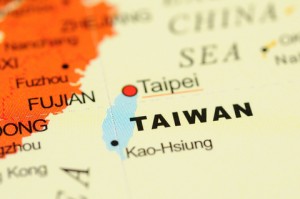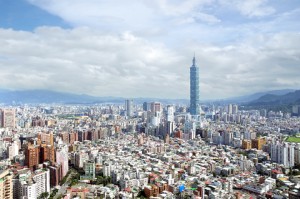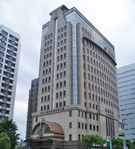
[Updated Oct 2020] A guide to serviced offices and office space for rent in Taipei as well as general information that may be useful if you are considering renting office space in Taipei City.
For further offices information or to search office space for rent in Taipei just click. Or contact us for any other office space query.
History & Geography
Known as the ‘City of Azaleas’ Taipei is the capital of the Republic of China, more commonly referred to as Taiwan. The city is located in the north of the island near the Xindian River to the south, and the Danshui River to the west. To the north of the city is Cising Mountain the highest extinct volcano in Taiwan. The Taipei basin was settled in the 18th century, predominantly by the Han Chinese, and by the 18th century had become an influential regional trading hub. The city became the capital of Taiwan in 1886 during the rule of the Qing Dynasty. Following the first Sino-Japanese War China ceded the entire island of Taiwan to Japan in 1895. Japan kept Taipei as the capital and erected many public buildings and houses for civil servants. Under the rule of the Japanese Taipei grew quickly into a substantial modern city. After the defeat of the Japanese in WWII the Kuomintang, (KMT) also known as the Chinese Nationalist Party, took over Taiwan. Following their defeat by the Communists on mainland China, the KMT, under their leader Chiang Kai-Sheck, fled to Taiwan and established Taipei as their provisional capital. Taipei expanded steadily and saw a massive population boom in the 1960s and 70s. The city has grown to become one of the most important in the region, both economically and strategically. While relations between Taiwan and the People’s Republic of China (PRC) have warmed significantly recently, the PRC still claims sovereignty over Taiwan, which is supported militarily by the United States.

Economy
Taiwan is an economic powerhouse that far belies its size, and Taipei is at the centre of the country’s economy. In the second half of the last century, the country underwent what is now referred to as the Taiwan Miracle, which saw rapid industrialization and economic growth. Today the country is one of the ‘Four Asian Tigers’, alongside Hong Kong, Singapore and South Korea. Taipei and the area surrounding it has been the industrial centre of the country for decades and is where the production of highly advanced technology, Taiwan’s main industry, takes place. Additionally, many of Taiwan’s textile factories are based in or around Taipei. Many Taiwanese companies have their headquarters in Taipei, including ASUS, Chunghwa Telecom, Mandarin Airlines, Tatung and D-Link. The GDP per capita of Taipei is the second largest of any city in Asia behind Tokyo, and the economy of the city has been expanding by approximately five percent per year.
Tourism
Tourism is a small but vital part of the economy of Taipei. The city sees approximately three million tourists every year, mostly from Europe, North America, and the rest of Asia. Taipei has no shortage of sites, one of the most famous perhaps being Taipei 101, the second tallest building in the world. Stunning views are accessible from the indoor and outdoor observatories. There are also several more historic buildings popular with tourists, such as the National Chiang Kai-Shek Memorial Hall, a stunning structure erected in memory of President Chiang Kai-Shek. The National Palace Museum is also popular with tourists due to its almost unrivalled collection of ancient Chinese artefacts. But Taipei is much more than just its buildings. The city is one of the most dynamic and bustling on earth, and literally never sleeps. Taipei has a plethora of night markets, the most famous being the Shilin Night Market, named for the district it is in. Here one can find every manner of food, clothing and consumer goods. The market usually opens in the late afternoon and stalls do not close until past midnight. The Ximending area of downtown is also renowned for its shops, restaurants, and entertainment. And the new Xinyi district has also proved popular with tourists. Many are unaware that as well as urban diversions, Taipei also has many beaches within striking distance and the nearby town of Bitan is well known for water sports.
Transport
Traffic in Taipei is notoriously bad, and renting a car is not recommended. Motor scooters and bicycles are popular with many residents of Taipei as traffic-beating measures. It is recommended that visitors buy an EasyCard, which can be used for every mode of public transport in the city. One simply fills the card with credit and then be left in a wallet or purse, where it can be read by sensory panels on buses and metros. Taipei’s bus system is used extensively by residents and serves those areas not reached by the Metro. The bus is often faster than driving thanks to specific bus lanes set aside specifically for the buses. The Taipei Metro, or MRT, is a fast, efficient and cheap way to get around the city and work is underway to connect it to Taiwan Taoyuan Airport. Taoyuan Airport serves all international flights and the nearer Songshan Airport is used for domestic connections. Both airports are linked to the city through highways.

Office space for rent in Taipei
The average monthly rental for Grade A office space in Taipei currently stands at TWD 3,000 per 36 square feet (a measurement referred to as a ‘ping’). This is about a fifth of what office space in Hong Kong, currently the most expensive city in the world, rents for. Alan Liu, the International Manager at Colliers International Taiwan recently told Asiaone Business that he believes that Taipei would only be an international competitor when Taipei City, Taipei County and Keelung City are merged. He also predicted that occupancy rate will rise as a direct result of the new flight from Taipei Songshan Airport to Haneda Airport in Japan, which will attract more Japanese companies to the city. Liu predicted that in the next three years office space rental will climb by at least 10 percent.
We carry out a free office space search and our advisory and acquisition services are also free, always. Our Taipei office space brokers and agents are globally regulated by the Royal Institution of Chartered Surveyors (RICS) ensuring the highest standards of commercial property advice and service at all times. We look forward to helping you find the best office space for rent for your business.

The Office Providers are Regulated by the Royal Institution of Chartered Surveyors (RICS)